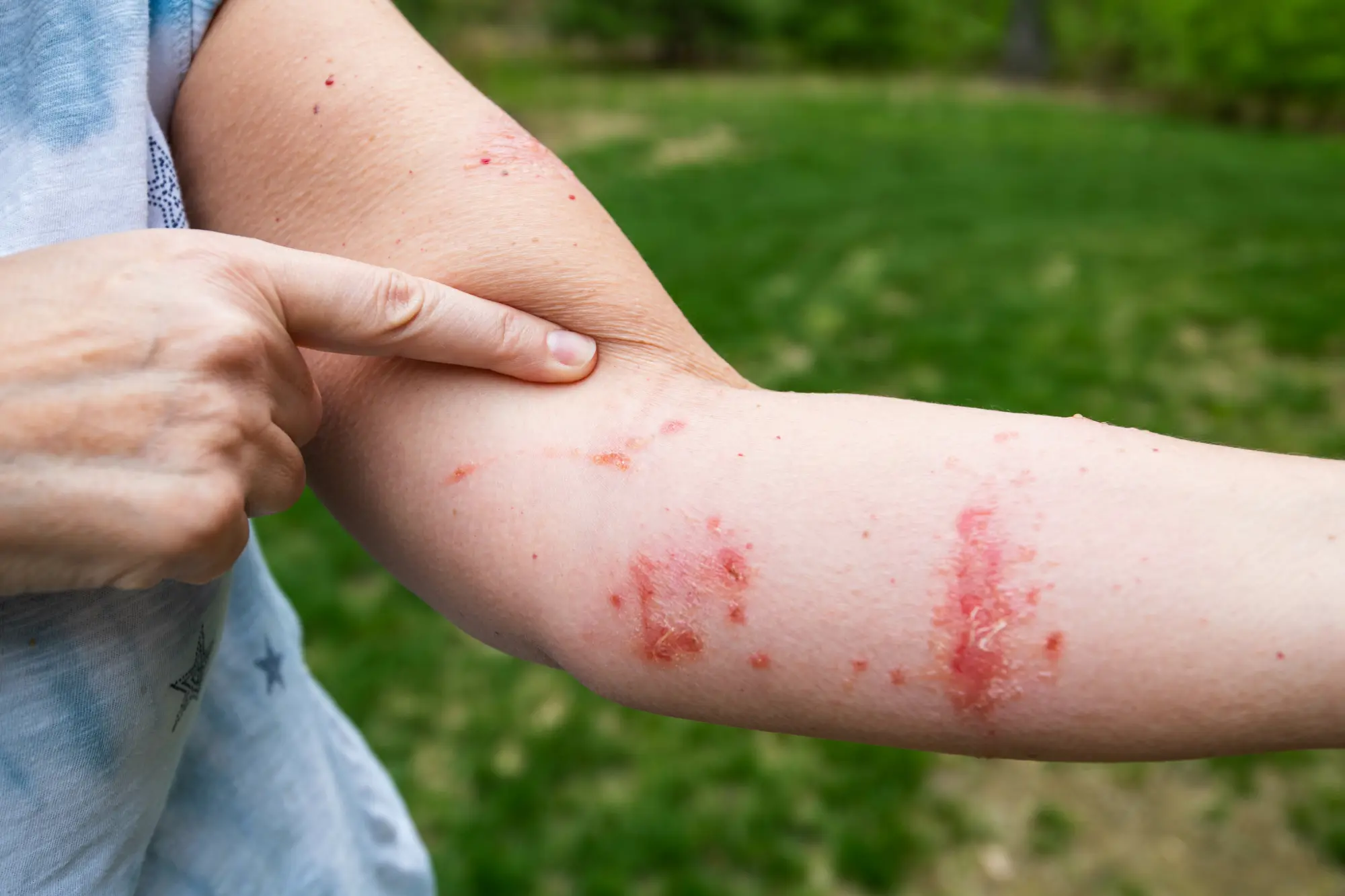
Poison Ivy
- Home
- Poison Ivy
Poison Ivy Rash Treatment in Terre Haute
Think it's "just a rash"? Sometimes it is. Sometimes it's a skin emergency. Poison ivy, poison oak, and poison sumac all cause allergic skin reactions that can range from mildly annoying to dangerously severe. Whether you need simple guidance or urgent care, Biltmore Dermatology is here to help you heal safely and completely.
What Causes a Poison Ivy Rash?
Poison ivy reactions are triggered by urushiol, an invisible, sticky oil found in the leaves, stems, and roots of poison ivy, poison oak, and poison sumac plants. It only takes a tiny amount — about 50 micrograms, less than a grain of salt — to cause a full-body allergic reaction in sensitive individuals.
You can come into contact with urushiol by:
- Brushing against a plant
- Touching contaminated clothing, tools, or pet fur
- Handling firewood or outdoor equipment
- Breathing smoke from burning poison ivy (a medical emergency)
Urushiol remains active for years on surfaces if not properly washed.
How Fast Does a Poison Ivy Rash Appear?
Most people develop symptoms 12 to 48 hours after exposure. First-time reactions might take longer. Repeat exposures often cause quicker, more intense responses because your immune system "remembers" the allergen.
Symptoms of a Poison Ivy Reaction
- Red, swollen skin
- Severe itching (often the first symptom)
- Streaky or patchy rash patterns where the plant brushed
- Clear or yellow fluid-filled blisters
- Painful swelling, especially on sensitive areas like the face, eyes, or genitals
In severe cases, the rash can spread widely, become infected, or cause breathing problems if urushiol is inhaled.
Is All Poison Ivy Serious?
No. Many poison ivy reactions are mild and can be treated at home with:
- Cool compresses
- Over-the-counter hydrocortisone cream
- Antihistamines for itching
- Oatmeal baths for soothing irritated skin
But not all cases are minor.
Poison ivy becomes a skin emergency when:
- The rash covers a large area of the body
- Sensitive areas like the eyes, mouth, or genitals are involved
- Blisters become infected (increased redness, warmth, pus)
- Severe swelling or pain develops
- Symptoms do not improve after several days of home treatment
When You Should See a Dermatology Provider for Poison Ivy
You should see a dermatology provider if:
- The rash spreads aggressively or worsens over several days
- There is severe swelling around the eyes, mouth, or groin
- Large areas of skin are blistered or oozing
- There are signs of infection, such as pus, fever, or severe pain
- The rash is not improving after several days of home treatment
If you experience trouble breathing or swallowing, this is a life-threatening medical emergency. Call 911 immediately.
How We Treat Poison Ivy at Biltmore Dermatology
Our treatments are customized based on how severe your reaction is:
- Prescription oral steroids (for severe or widespread cases)
- Topical steroid creams (for localized rashes)
- Antihistamines to control itching and allergic response
- Wound care for ruptured blisters
- Antibiotics if a secondary infection develops
- Education on prevention and skin recovery
You'll leave with a clear plan, not just a prescription.
We stay involved until your skin is fully healed and protected.
Why Delaying Treatment Can Be Dangerous
Poison ivy isn't just uncomfortable — untreated severe reactions can cause:
- Permanent skin scarring
- Deep skin infections (cellulitis)
- Chronic allergic sensitivity (lower amounts cause bigger future reactions)
- Serious airway emergencies if urushiol is inhaled
Early treatment prevents bigger problems later.
Common Myths About Poison Ivy
- Scratching spreads the rash. Not true. Scratching can cause infection, but the rash only spreads if urushiol oil remains on the skin.
- You can't get poison ivy from pets. False. Pets don't react to urushiol themselves, but their fur can carry the oil to humans.
- Dead plants are safe. Wrong. Urushiol remains potent for years on dead plant material.
- Once you get it, you're immune. Incorrect. Repeated exposures usually increase sensitivity, not decrease it.
No referral is needed. Walk in today. Stay for the care and expertise.
From Terre Haute to Vincennes, patients trust Biltmore Dermatology for expert care when skin emergencies strike. Walk in today or contact us to request an appointment — we're ready to help.